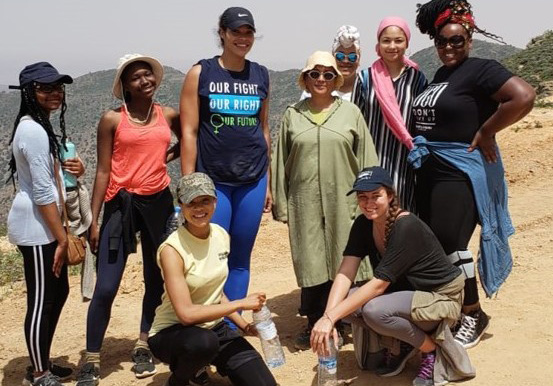While current divisions around the world demonstrate the necessity of fostering global connection, study abroad and language education continue to be inaccessible for many students, particularly for students in low-income schools in the Southeast United States. With this in mind, I co-founded an organization called the Women’s Global Empowerment Initiative (WGEI). WGEI promotes short-term study abroad programs for young women of color in high schools in Atlanta, Georgia; Louisville, Kentucky; and New Orleans, Louisiana. Our curriculum uniquely combines social justice, language learning, and social-emotional literacy. With our partner organization, Dar Si Hmad, located in Agadir, Morocco, students explore the global intersections of race, gender, indigenous rights, and environmental justice. Students also participate in excursions through which they build personal and professional relationships within Morocco’s southwest community.
WGEI ran two programs in July 2017 and 2018 and our two cohorts of students have shown profound personal and professional growth, as well as civic engagement. Last summer, through the graduate fellowship at AC4 at the Earth Institute, I conducted an evaluation research to assess WGEI’s impact on students. Through surveys and interviews, we learned a lot from students and community partners as we are working to scale-up our initiative.
Immaya and Adriana are two students from the 2018 cohort whose post-trip reflections on social issues were quite thoughtful. Adriana, a high school junior, shared her thoughts with us: “Before this program, I was oblivious to different issues related to the environment. I didn’t know what environmental racism was and what the level of effects were of human activity on the environment. I also didn’t realize how interconnected social systems were with environmental issues. The most surprising part of [Dar Si Hmad’s] fog project was seeing the actual installation of the fog nets and learning about the way water access is connected to women’s issues.”
Immaya, who just started college this fall, said: “I’ve noticed that after the trip I think about it constantly. I can draw comparisons between Morocco and the United States. I am more conscious about the environment, especially water consumption and trash, as well as race issues here in the States. I am also asking more questions about migration than I did before.”
In addition to social issues, WGEI emphasizes social-emotional development and local community transformation. Adriana shared: “the trip to Morocco has actually helped me to step out of my comfort zone mentally, emotionally, and physically. I’ve been able to acknowledge my preferences and faults without hesitation, be open to expressing how I feel on topics and experiences, and physically challenge myself whether it’s yoga, or with new foods. I gained this sense of knowledge and appreciation for being a global citizen and was able to take it back home with me. I was able to make the goal of contributing more to environmental issues here in Kentucky and now we are developing a food garden on behalf of Black Student Union.”
Developing an organization from the ground-up brings challenges from fundraising and grant-writing, to the complexities of working with many different schools and partner organizations. However, as a master’s student in International Educational Development, it is critical that I apply the skills I am learning in my courses to practical opportunities with students. Despite programmatic challenges, the power and brilliance of the young WGEI women, makes it worthwhile. Our students have interests in public health, language learning, environmental justice, civil rights law, and so much more. It is only a matter of time before they are calling the shots on the issues that affect their communities most, with the added ingredient of a global perspective.
Women’s Global Empowerment Initiative (www.wgei.info // @womensgei)
